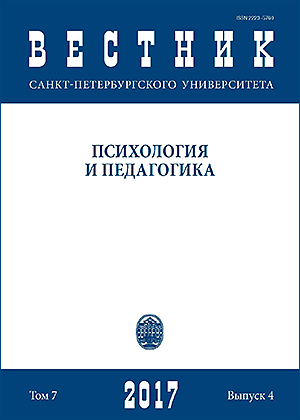Influence of irrelevant verbal satiation on the negative priming effect.
DOI:
https://doi.org/10.21638/11701/spbu16.2017.403Abstract
Multiple repetitions of the same word induce the verbal satiation effect — a feeling of complete or partial loss of meaning for the given word. Objectively this effect manifests itself in slower performance for tasks associated with a repeated word. According to V.Allakhverdov (2000) we assume that the attempt to keep realizing the unchanged content will help to “forget” the common meanings of this content. Our consciousness cannot stay empty, thus some other new meanings (which were previously “blocked but activated” because of a negative choice) should replace the “forgotten” meanings. These new meanings should not be necessarily related to the repeated stimuli. Here we used the negative priming method for experimental control of the “blocked but activated” stimuli. The main task for our participants was to read a target word as quickly as possible while ignoring the distractor word. The additional task appeared after every 3 probes of the main task: we asked our participants to read 10 words aloud (in the control group) or repeat the same one word aloud for 10 times (in the experimental group). The negative priming effect was found — the reaction was slower for the target stimuli, which have been previously presented as the distractors — but it decreased under the influence of verbal satiation in those subjects who performed the main task more slowly (they also pronounced the repeated words much more slowly in comparison to the control group). In addition, the irrelevant verbal satiation speeded up overall subjects’ responses during the main task.
Keywords:
verbal satiation, negative priming, awareness, aftereffects, ignored distractors
Downloads
References
Downloads
Published
How to Cite
Issue
Section
License
Articles of "Vestnik of Saint Petersburg University. Psychology" are open access distributed under the terms of the License Agreement with Saint Petersburg State University, which permits to the authors unrestricted distribution and self-archiving free of charge.




